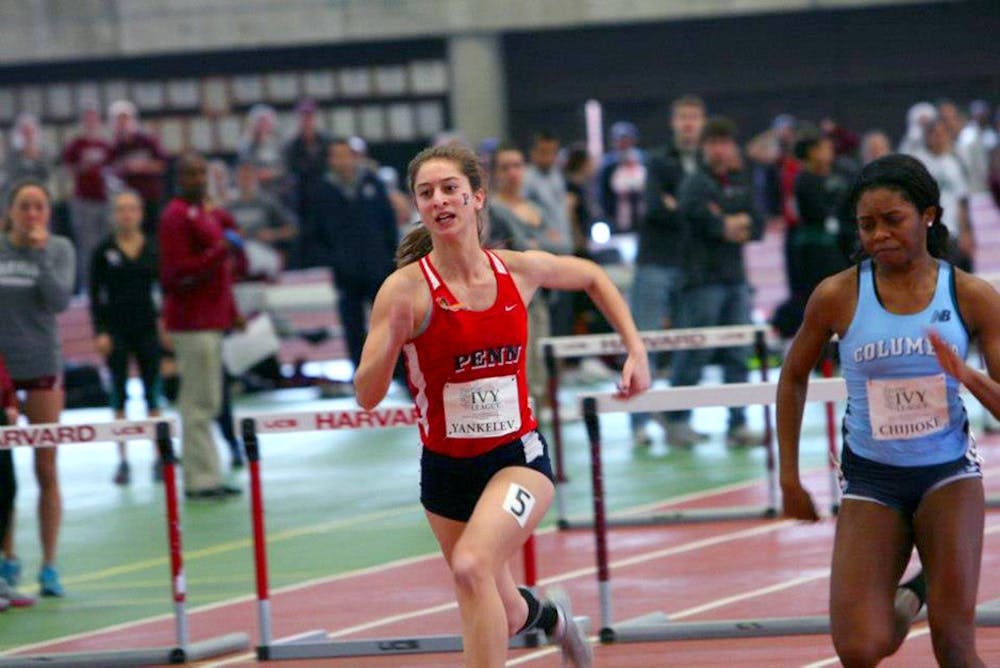
Freshman hurdler Eliana Yankelev became involved with Penn’s Athletes and Allies Tackling Homophobia early in her freshman year, quickly becoming its advocacy chair.
The red water bottle. At Penn, it’s the universal sign for “I’m an athlete.” It’s also the universal sign for “I’m straight.”
Statistically speaking, if one out of every 10 individuals in a given population identified as LGBTQ, then between 50 and 70 Penn varsity athletes should self-identify as such.
But as you struggle to think of even two or three athletes who fit that bill, you will understand my sentiment exactly. Penn Athletes and Allies Tackling Homophobia, commonly known as PATH, is a group dedicated to the advancement of the status of gay athletes and the fight against homophobia in athletics.
But the group is incredibly small and there are only a handful of varsity athletes actually in the group.
I started college knowing that I wanted to be out. I felt no hesitation at all coming out to new people and introducing myself to members of the LGBTQ community here.
But unfortunately, I didn’t feel the same way about coming out to my team. During our first practice of the semester, the same fear that kept me from coming out as a high school track and field athlete hit me — hard.
Luckily for me, two weeks before the start of the semester, I had done a photo shoot with Jeff Sheng, the creator and producer of Fearless, a photo-documentary project in which “more than 150 openly gay, lesbian, bisexual or transgender (LGBTQ) student-athletes” were photographed.
Sheng publicly posted the photos from my shoot on his Facebook page, tagging me in the post, officially making my status as a gay athlete public.
And only a few days before, I hadn’t even decided when or how I would come out to my team. I sat in my dorm room, with my computer in front of me. And without really thinking, reposted his picture and simply thanked him for letting me be a part of the project.
So there it was — my coming out. But it was not just to only the track team and my Facebook friends. I received nothing but positive feedback and love from those who saw the post. That one picture reinforced my confidence in my sexuality and encouraged me to completely trust my teammates and community to support me. So yes, in a sense, I feel that I had come out again to myself.
Track and field is just one of those sports where everyone ends up hooking up with each other. Throughout high school, I saw the top athletes in each of the leagues, districts and even the state publish their relationships on Facebook.
At the state championship meet, where athletes stayed in co-ed university dorms for three nights, I was judged and stigmatized for not “getting with guys.”
All sports at an elite level have gendered expectations of “strength, competitiveness, courage and muscularity,” which negatively impact perceptions of both male and female athletes, according to Pat Griffin, who has consulted the NCAA on LGBTQ issues. Homophobia and athletics have unfortunately walked hand in hand for decades.
But in the past year alone, athletes from the MLS, MLB, NHL and NFL have spoken out in support of teammates “who might be gay.” For example, professional soccer player Robbie Rogers’ coming out and subsequent retirement last month was answered with a video of support from the entire Seattle Sounders Football Club.
Last month at the Ivy League Heptagonal Indoor Championships, dozens of members of my team pinned Pride ribbons to their warmups, backpacks and even uniforms to join the movement to end homophobia in athletics.
The night before the meet, the entire women’s team crammed into one hotel room to get ourselves ready for two days of the physical, mental and emotional overhaul that is Heps. At the end of the meeting, I thanked my team for supporting me as a teammate, friend and person, as well as for creating an environment in which I don’t have to worry about hiding my sexuality and, in reality, my identity.
So to the thousands of athletes who aren’t fortunate enough to belong to an athletic community in which they can find support and, in Penn’s case, solidarity from their teammates, things are changing.
ELIANA YANKELEV is a College freshman from Lower Merion, Pa. She is the advocacy director of PATH and a hurdler on the Penn track & field team.
SEE ALSO
Penn track’s Picciallo triumphs against adversity
For Penn track’s Pitt, quick learning equaled quicker success
Penn track’s Brenza throwing way into record book
The Daily Pennsylvanian is an independent, student-run newspaper. Please consider making a donation to support the coverage that shapes the University. Your generosity ensures a future of strong journalism at Penn.
DonatePlease note All comments are eligible for publication in The Daily Pennsylvanian.





